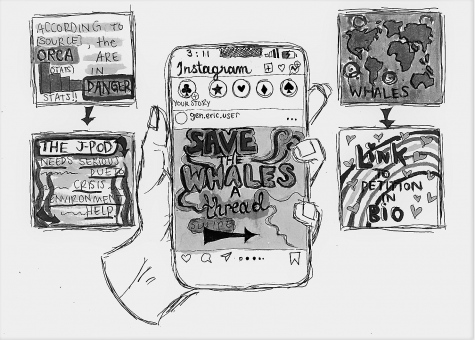Infographics desensitize us from the issues at hand
September 16, 2021
It is time to stop with the Instagram infographics. Everyone has seen them; the super-cute designs, maybe a frosted cake, with a gut-wrenching line about people dying, mass incarceration, abortion—any trending issue.
There’s nothing wrong with educating the public on issues you find important. That’s essential to being a part of a community and understanding the array of opinions around you. Social media is no longer a place just for selfies and food pictures; we have reached the point where we can talk about real issues on the same platform that we used to share pictures of our lattes. That said, there’s a point where these important issues are no longer being taken seriously.
One of the problems with these viral posts is not the sentiment behind the post but rather the nature of the picture itself. Generally speaking, this type of content is not informative in the slightest. They frequently say something similar to “Defund the Police” or “Abortion is Healthcare.” These are meaningful political statements, but what do they accomplish? Most users click through stories quickly, just briefly skimming whatever information they may be attempting to address. I can’t say I spend a lot of time analyzing everyone’s 10-second post. These posts don’t necessarily help inform users of the problem they supposedly address. Instead, this information gets added to the influx of social media content we are consuming.
I first became fully aware of the number of infographics I was encountering last spring. It started with COVID-19 safety information and quickly segued into the Black Lives Matter movement and more. Truthfully, at the time, these posts helped me stay informed, as it was impossible to open social media without being bombarded with one-sentence fragments of the news.

The wave of infographics started with good intentions. Activists wanted to be able to inform people of the things they are passionate about without overwhelming them. Maybe if the post isn’t intimidating, people will read it. The problem is how quickly we stop covering one problem to move to the next.
These issues are still happening. COVID-19 is still surging, Black lives are still being taken, but Instagram has moved on to the next hot topic. It’s been a long year, and we have all seen more things than we previously thought we could handle as a result of the power of technology and social media. And while I think it’s a good thing to be in tune with the world, because of social media we only tend to focus on the issues directly in front of us. Once the election started, Instagram was no longer covering the Black Lives Matter movement, and we moved on.
I can’t stress enough the importance and meaning behind being informed about what’s going on in the world. But social media is not the place for that meaning to take place. When you go from a selfie on one story to another person’s story that ranges from “Rape is bad” to “Free Palestine” on a cake, it’s impossible not to feel desensitized. How could you care about everything when all you get from each post is a snippet of tragedy followed immediately by another tragedy?




